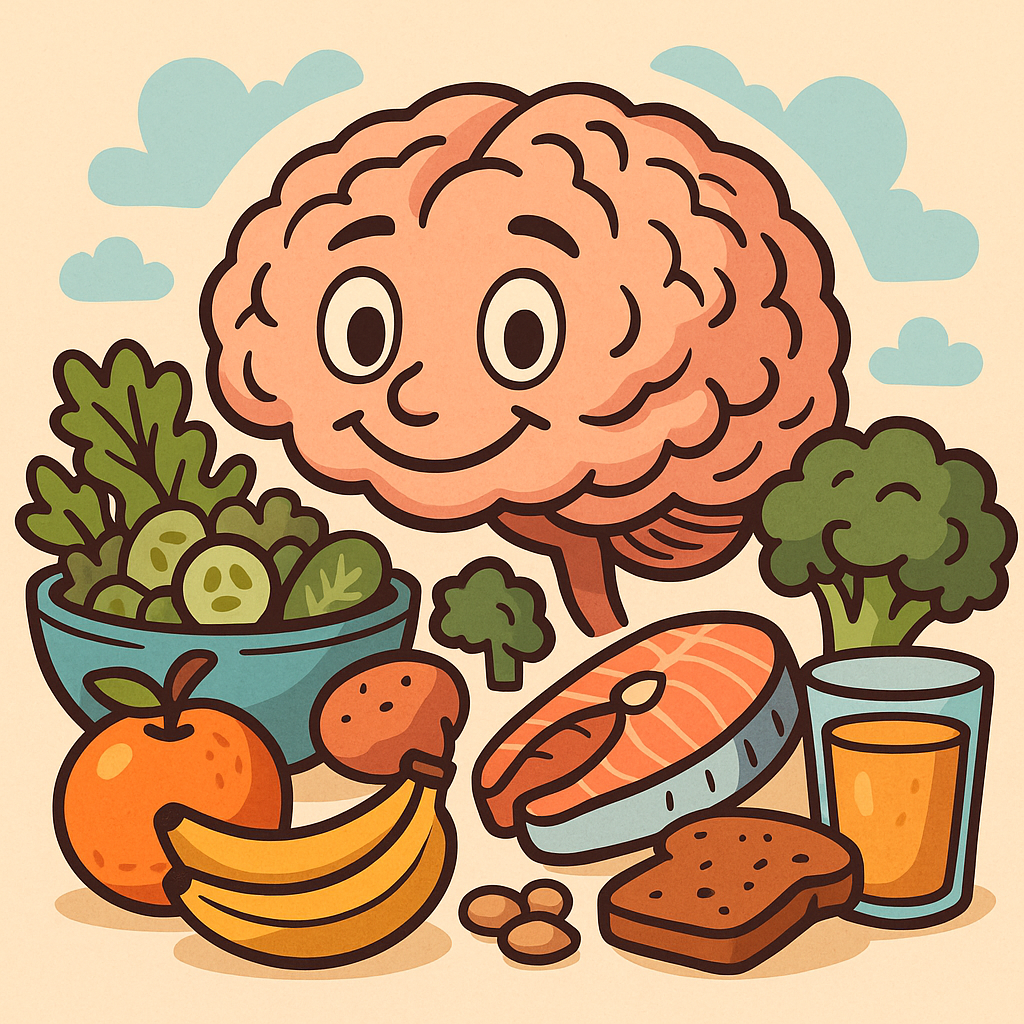Eating well isn’t just about your waistline—it’s about your mind. Diet and brain function are linked in surprising ways—new research shows specific foods can support memory, mood, and cognitive resilience. Discover the foods and strategies backed by science.

Why Diet and Brain Function Go Hand in Hand
Your brain runs on nutrients. It uses about 20% of your body’s total energy at rest—even though it makes up roughly 2% of its weight. That energy comes from what you eat:
- Glucose fuels everyday brain activity.
- Healthy fats (like omega-3s) support cell membranes and communication.
- Micronutrients like B vitamins, iron, and antioxidants are essential for neurotransmitter synthesis and protecting brain cells.
1. The Rise of the MIND Diet: A Brain-Boosting Plan
The recently popular MIND diet (Mediterranean-DASH Intervention for Neurodegenerative Delay) combines elements of the Mediterranean and DASH diets. Research shows it can reduce Alzheimer’s and dementia risk by up to 53% when followed rigorously.
Core elements of the MIND diet:
- Green leafy vegetables – Kale, spinach, collards
- Other vegetables
- Berries – especially blueberries and strawberries
- Nuts – almonds, walnuts
- Whole grains
- Fish (once a week)
- Poultry (twice weekly)
- Olive oil as main fat source
- Limited butter, cheese, red meat, sweets, and fast food
Key benefits:
- Neuroprotection: Antioxidants in berries and leafy greens reduce oxidative stress—one of the triggers of cognitive decline .
- Anti-inflammatory effect: Olive oil and fish reduce inflammation linked to Alzheimer’s.
- Blood flow: Whole grains and nuts support vascular health, helping deliver oxygen to the brain.
2. Keto and Brain Fog: Clarifying the Connection
The ketogenic (keto) diet—high-fat, very low-carb—has gained attention for its potential brain benefits:
- Reduced brain fog: Some individuals report clearer thinking once in ketosis.
- Neuroprotective ketones: Ketone bodies like beta-hydroxybutyrate may protect neurons in epilepsy and neurodegenerative conditions.
What to know:
- Short-term benefits: Improved focus, energy stability, fewer sugar crashes.
- Potential drawbacks: Initial “keto flu,” nutrient gaps, and limited fiber if not balanced with vegetables.
- Emerging studies: Animal models suggest ketones can inhibit amyloid-beta buildup (linked to Alzheimer’s), but human data is still early .
Tips for safer keto brain benefits:
- Include non-starchy vegetables (spinach, broccoli).
- Prioritize omega‑3 fats (seafood, flax, chia).
- Monitor minerals like sodium, potassium, and magnesium.
3. Probiotics, Gut Health & the Brain
A growing area of interest: the gut–brain axis. Scientists believe gut microbes send signals that affect mood, cognition, and stress resilience.
- Fermented foods like kefir, yogurt, sauerkraut support beneficial gut bacteria.
- Short-chain fatty acids from fiber fermentation can reduce anxiety-like behavior in animal studies .
- Recent trials link probiotics to modest improvements in mood and memory in older adults.
Practical ways to support gut–brain health:
- Eat a wide variety of fibrous plants (beans, whole grains, vegetables).
- Everyday fermented foods (e.g. a spoonful of kimchi or a serving of yogurt).
- Consider a multi-strain probiotic if otherwise healthy and cleared by a healthcare provider.
4. Spotlight on Specific Nutrients
Omega‑3 Fatty Acids
- DHA and EPA, abundant in fatty fish (salmon, sardines), support neuronal health and reduce inflammation.
- Higher DHA levels correspond to better memory and slower brain aging.
B Vitamins (B6, B12, Folate)
- Essential in homocysteine regulation, high levels of which have been linked to cognitive decline.
- Supplementation in those with low levels shows improved memory recall.
Antioxidants (Vitamin C, E, Flavonoids)
- Vitamin C supports neurotransmitter synthesis.
- Vitamin E preserves nerve cell membranes.
- Flavonoid-rich foods (cocoa, berries, tea) benefit blood flow and brain function.
5. Smart Snacking for a Sharper Mind
- Walnuts: High in alpha-linolenic acid (a plant-based omega‑3).
- Blueberries: Flavonoids target brain regions tied to learning.
- Dark chocolate (70%+ cocoa): Contains flavanols that may enhance mood and blood flow.
- Green tea: Caffeine + L-theanine combo can improve attention without jitters.
6. Hydration: The Omitted Power Move
Dehydration—even mild—can impair concentration, alertness, and short-term memory. Aim for:
- 0.5 to 1 oz of water per pound of body weight daily.
- More on hot days or with intense exercise.
7. Tips to Put Diet & Brain Function into Action
- Start your day right – breakfast with protein, fat, and berries.
- Color your plate – aim for varied veggies and whole grains.
- Snack smart – reach for nuts, seeds, yogurt, or fruit.
- Include fatty fish 1–2 times per week (or algae-based omega‑3).
- Enjoy fermented foods daily – kimchi, kefir, kombucha.
- Stay hydrated – keep a reusable bottle nearby.
8. Emerging Trends & Future Research
- Personalized nutrition: New tech aims to tailor diets based on genetics (“nutrigenomics”).
- Neuro-nutrition supplements: NAD+, lion’s mane mushrooms, and phosphatidylserine are being studied—but rigorous long-term data is limited.
- Digital monitoring: Apps and wearables will soon track nutrient intake alongside mood, brain performance, and biomarkers.
Final Takeaway
Growing evidence links diet and brain function, showing that what you eat supports:
- Cognitive protection (via antioxidants and anti-inflammatory fats).
- Mental clarity (ketone support, blood sugar balance).
- Mood support (gut-brain interaction, B vitamins, hydration).
Integrating brain-supportive food choices—vegetables, berries, fatty fish, fermented items, and hydration—into a varied, whole-foods diet is a practical, powerful strategy. If you’re interested in exploring tailored nutrition, talking to a registered dietitian or healthcare provider can enhance benefit while avoiding gaps.
References
Morris, M. C., Tangney, C. C., Wang, Y., Sacks, F. M., & Barnes, L. L. (2015). MIND diet slows cognitive decline with aging. Alzheimer’s & Dementia. Retrieved from https://en.wikipedia.org/wiki/MIND_diet en.wikipedia.org+7en.wikipedia.org+7eatingwell.com+7
Vauzour, D. et al. (2020). The effect of healthy diet on cognitive performance among healthy seniors: A mini-review. Frontiers in Human Neuroscience. Retrieved from https://www.frontiersin.org/journals/human-neuroscience/articles/10.3389/fnhum.2020.00325/full frontiersin.org+1en.wikipedia.org+1
Emerson, N. D., Hansell, D., & Travagli, R. A. (2024). Balanced diet linked to better brain health and cognition: Large-scale study shows. Nature Mental Health. Retrieved from https://www.news-medical.net/news/20240403/Balanced-diet-linked-to-better-brain-health-and-cognition-large-scale-study-shows.aspx en.wikipedia.org+4news-medical.net+4sciencedaily.com+4






